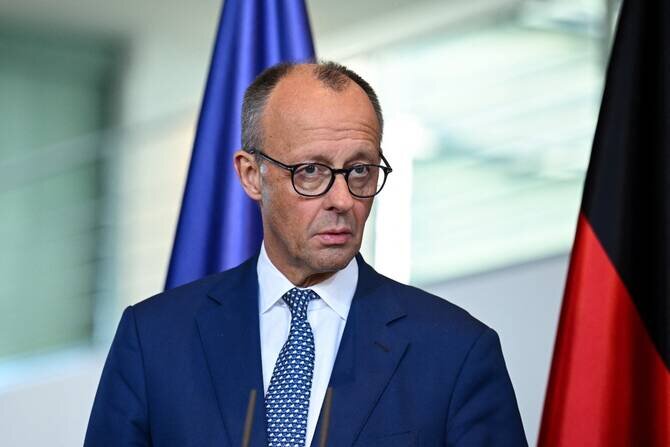
Germany's Merz Faces Mounting Woes After Six Months in Power
Chancellor Friedrich Merz's coalition struggles with infighting, policy deadlock, and sliding poll ratings.
After only six months in power, German Chancellor Friedrich Merz is facing a tumultuous period for his ruling coalition.
The government has encountered internal conflicts, policy stagnation, and declining popularity, casting doubt on its ability to address the electorate's concerns.
These challenges have emerged despite Merz's campaign promises to revitalize the stagnant economy, enhance national defense capabilities, and tighten immigration policies following the previous administration's lethargic tenure.
The CDU/CSU bloc, which won February's general election, now finds itself in a deadlock with poll ratings that mirror those of the far-right Alternative for Germany (AfD), the party that secured second place in the polls and has since become the largest opposition force.
The coalition's woes are exacerbated by the Social Democrats' (SPD) diminished popularity, which sank to around 13-15% after a disappointing election performance.
The government's focus on immigration issues rather than economic, educational, and security matters is among the key concerns of dissatisfied citizens.
These tensions have been further amplified by disagreements within the coalition over various policy initiatives, such as pension reforms and conscription revival for military service, which highlight the difficulty in achieving consensus between CDU/CSU and SPD members.
Merz's administration faces additional scrutiny due to its handling of migration policies.
In an effort to counter the AfD's influence, Merz has adopted a hardline stance on immigration that has alienated some within his own party and among coalition partners.
The AfD perceives these internal struggles as an opportunity to expand its influence, arguing that the conservative government is unable to fulfill its election pledges and may not survive beyond the next term.
The current political climate in Germany, characterized by widespread dissatisfaction with the government's performance, has raised concerns about potential coalition crises and early elections.
This uncertainty leaves many Germans questioning the stability of their leadership and the fulfillment of electoral promises.
The government has encountered internal conflicts, policy stagnation, and declining popularity, casting doubt on its ability to address the electorate's concerns.
These challenges have emerged despite Merz's campaign promises to revitalize the stagnant economy, enhance national defense capabilities, and tighten immigration policies following the previous administration's lethargic tenure.
The CDU/CSU bloc, which won February's general election, now finds itself in a deadlock with poll ratings that mirror those of the far-right Alternative for Germany (AfD), the party that secured second place in the polls and has since become the largest opposition force.
The coalition's woes are exacerbated by the Social Democrats' (SPD) diminished popularity, which sank to around 13-15% after a disappointing election performance.
The government's focus on immigration issues rather than economic, educational, and security matters is among the key concerns of dissatisfied citizens.
These tensions have been further amplified by disagreements within the coalition over various policy initiatives, such as pension reforms and conscription revival for military service, which highlight the difficulty in achieving consensus between CDU/CSU and SPD members.
Merz's administration faces additional scrutiny due to its handling of migration policies.
In an effort to counter the AfD's influence, Merz has adopted a hardline stance on immigration that has alienated some within his own party and among coalition partners.
The AfD perceives these internal struggles as an opportunity to expand its influence, arguing that the conservative government is unable to fulfill its election pledges and may not survive beyond the next term.
The current political climate in Germany, characterized by widespread dissatisfaction with the government's performance, has raised concerns about potential coalition crises and early elections.
This uncertainty leaves many Germans questioning the stability of their leadership and the fulfillment of electoral promises.










